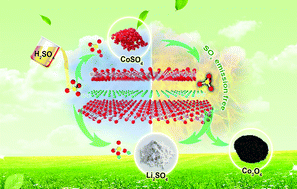Environmentally benign process for selective recovery of valuable metals from spent lithium-ion batteries by using conventional sulfation roasting†
Abstract
Recycling of spent lithium-ion batteries (LIBs) has attracted intensive attention owing to their potential environmental risk and the importance of the supply of critical metals. Sulfation roasting as a traditional technology is not considered environmentally friendly due to serious SOx emission. The usage of over-stoichiometric amounts of sodium salt results in high sodium content in the leaching solutions bringing about difficulties for the preparation of qualified lithium products. It is usually not easy to achieve high recovery selectivity of metals. Herein, we find it is possible to eliminate secondary emission and no sodium is included in the process of spent LIB (LiCoO2 as a case study) recycling if the transfer pathway of sulfur among different phases is well controlled. At the same time, high lithium recovery selectivity is achieved. The principles of green chemistry for substitution of chemicals with a low environmental impact and improving the atomic efficiency of sulfur are introduced during traditional sulfation roasting. A pretreatment step of aging with sulfuric acid at 393 K is introduced to form cobalt sulfate which in the following heat treatment step will further preferentially react with the remaining LiCoO2 until it is completely consumed. By controlling the amount of sulfuric acid, sulfur can be recirculated and recycled thoroughly in the form of SO42−, instead of SOx emission and the atomic efficiency of sulfur can be highly improved. After leaching with water, the concentration of Li+ in the leachate reaches 19.82 g L−1; 99.3% lithium and 98.7% cobalt were recuperated as Li2CO3 and Co3O4 with a purity of 99.89% and 99.95%, respectively. Our findings propose an environmentally benign and easily implemented strategy for selective recycling of spent LIBs. The fundamentals provide inspiration for separation and extraction fields such as mining and recycling of complex systems composed of multiple metals.



 Please wait while we load your content...
Please wait while we load your content...